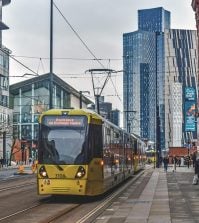In pursuit of public good: the need for a welfare revolution in South Africa

Jelena Vidojević of the New South Institute argues that South Africa must introduce comprehensive welfare reform if it is to address socio-economic divisions and deliver for the public good
South Africa is considered a middle income country, yet many of its citizens live in a condition of extreme, chronic and multidimensional poverty. Poverty persisted in post-apartheid South Africa because economic growth was neither rapid enough, nor sufficiently inclusive to create work for low skilled, unemployed men and women. A large proportion of those actively participating in the labour market, moreover, live below the official poverty line. The persistence of high levels of inequality represents not only a social tragedy, but a serious threat to South Africa’s delicate democracy. It threatens the basics of solidarity, community and common purpose.
In the 1990s, South Africa’s policymakers were preoccupied with practices and models that were ascendant internationally. For example, the principles of New Public Management were dominant during the reorganisation of the post-apartheid civil service. Wittingly, though often unwittingly, the introduction of managerial models of government privileged a focus on efficiency in government rather than a focus on realising the public good. The results of these reforms can be seen in some areas of South Africa where the poor live in under-serviced informal settlements and the upper middle-classes live in gated complexes that have high levels of security and are increasingly self-sufficient.
The common good is best served not by mimicry or mechanical re-application, but by carefully understanding local contexts and from learning and adapting relevant experiences from elsewhere. What must be mastered is a fine-tuned combination of lessons from experiences both past and present, both national and international. In South Africa, we see the public good displaced from policy debates in multiple areas, including in welfare reform.
“There are no conditions of life to which a man cannot get accustomed especially if he sees them accepted by everyone else.” – Anna Karenina, L. Tolstoy
The ANC (African National Congress) inherited a state that from a social policy perspective was quite unusual and generous (relative to rest of the continent). There were well developed welfare instruments for white people and by the end of the Apartheid period, some of these instruments had been extended to black people too, though on an unequal basis. Also, the budget was highly redistributive. Despite a favourable starting position to introduce and develop a comprehensive welfare system, bold and radical policy interventions, the ANC insisted that South Africa did not and should not have a welfare state; the ANC policy was to promote development and not expand ‘welfare’. In this context, ‘welfare’ was not only reduced to social assistance (‘handouts’), but completely delinked from development, and it seems that the question of a ‘good life’ was not even on the agenda.
Comprehensive welfare reform, that unfortunately did not occur, could have been one of the initial steps in the long-term process of rebuilding trust in a society with an extremely fragile social fabric. Instead, the path taken (social grants) continues to exclude a significant part of the population, but now on slightly different terms. For example, South Africa is widely praised for the coverage, generosity and efficiency of its social protection system. For those covered by the system, one should not understate the positive effects that social grants have had on poverty and inequality, school enrolment and attendance, health and per capita consumption. But despite these successes, the system suffers from fundamental weaknesses, the most important one being the exclusion of those aged 18-59 with little or no income, many of whom are able bodied men. Systems that exclude, by design or by default, apart from being unfair, are usually very expensive, in human and financial costs. Simply put, the South African social grants system provides assistance to a core and vulnerable section of the population, but comes at the expense of the public good.
There are new and ongoing challenges for public policy everywhere and at different scales: war in Europe, new developments in technology that threaten to exacerbate global divides, not to mention the challenges that emphasise what it means to be human: an ecological emergency, new illnesses, and a lack of care to name a few. Inherited social systems, those that emerged in the aftermath of WWII in Europe and were then replicated (with various success) across the world, need to be fundamentally redefined and redesigned, even in the places where they were once highly successful.
What needs to emerge is a new social settlement, followed by a set of renewed institutions. The basis of this new social settlement should start with developing a vision of an equitable and a more fair future, while responding to widespread uncertainty and precarity. An important part of that vision will surely be based on rehabilitation of certain principals, which has almost completely disappeared from policy debates, one of them being ‘universalism’.
South Africa, as well countries facing similar challenges, first and foremost needs to address the deeper legacy challenges and structural and spacial social-economic divisions, and old/traditional social risks, while at the same time developing and introducing instruments that will adequately tackle ‘new social risks’. Whatever the particular solutions look like, successful public policy is dependent on building institutions that work universally in the interests of the public good.
Author
Jelena Vidojević is co-founder and research fellow at the New South Institute.
Read more: Building blocks: lessons from the global south on reforming the architecture of government






















South Africa’s welfare system needs a serious overhaul.
The article points out that while we’ve made some progress, our current system isn’t working for everyone. Too many people are still living in poverty, and the system doesn’t do enough to help those who aren’t old or disabled. This is exactly why SASSA : https://sassa-status.co.za is failing so much.
It’s time for a fresh approach. We need a welfare system that works for everyone, not just a select few.